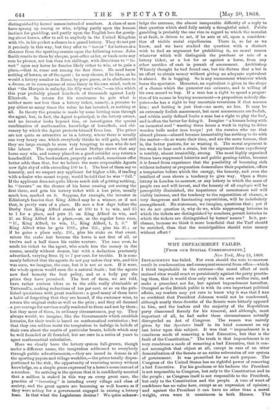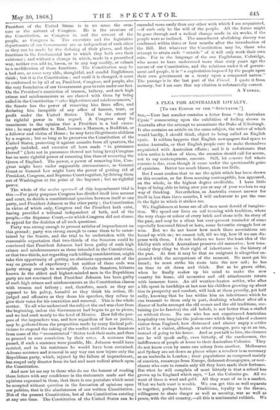WHY IMPEACHMENT FAILED.
[FROM OUR SPECIAL CORRESPONDENT.]
New York, May 15, 1868. IMPEACHMENT has failed. For even should the vote to-morrow result in condemnation and consequent removal from office—which I think improbable in the extreme—the moral effect of such maimed rites would react so perniciously against the party practis- ing them, that it would thus only work its own swifter ruin, and make a precedent not for, but against impeachment hereafter. Occupied as the British public is with its own important political affairs, my readers may yet care to know why it was that I was so confident that President Johnson would not be condemned, although nearly three-fourths of the Senate were bitterly opposed to him, and the leaders and the majority of the Republican party clamoured fiercely for his removal, and although, most important of all, he had under these circumstances actually disregarded an Act of Congress. The reason was naively given by the Spectator itself in its brief comment on my last letter upon this subject. It was that "impeachment is a cumbrous mode of removing a bad Executive, but that is the fault of the Constitution." The truth is that impeachment is so very cumbrous a mode of removing a bad Executive, that it can- not accomplish that object at all, except in case of an utter demoralization of the Senate or an entire subversion of our system of government. It was prescribed for no such purpose. The Congress of the United States has no rightful power of removing a bad Executive. For his goodness or his badness the President is not responsible to Congress, but only to the Constitution and to the people ; as Congress itself is not responsible to the President, but only to the Constitution and the people. A vote of want of confidence has no value here, except as an expression of opinion ; and against the President it can have no other than a moral weight, even were it unanimous in both Houses. The
President of the United Stktes is in no sense the crea- ture or the servant of Congress. He is the creature of the Constitution, as Congress is, and the servant of the people, as Congress is. The executive and the legislative departments of our Government are as independent of each other as they can be made by the defining of their places, and their functions in the fundamental law to which they both owe their existence ; and without a change in which, made in a prescribed way, neither can add to, lessen, or in any way modify, or submit to a modification of those functions. The Constitution may be a bad one, as some very able, thoughtful, and candid Englishmen think ; but it is the Constitution ; and until it is changed, it must be conformed to by all of us, President, Congress, and people, else the very foundation of our Government goes to ruin under our feet. On the President's conviction of treason, bribery, and such high crimes and misdemeanours as are classed with them by being called in the Constitution " other high crimes and misdemeanours," the Senate has the power of removing him from office, and declaring him incapable of any office of honour, trust, or profit under the United States. That is the extent of its rightful power in this regard. A Congress may be unanimous in the opinion that a President is a bad execu- tive; he may sacrifice to Baal, become a Mormon, a Buddhist, or a follower and victim of Home ; he may have illegitimate children by a negress ; but so long as he preserves the Constitution of the United States, protecting it against assaults from all quarters, the people included, and executes all laws made "in pursuance thereof" (Acts not in pursuance thereof not being laws) Congress has no more rightful power of removing him than of removing the Queen of England. The power, a power of removing him, Con- gress might have under supposable circumstances, as General Grant or General Lee might have the power of getting rid of President, Congress, and Supreme Court together, bydriviug them out of Washington at the point of the bayonet ; but no rightful power.
The whole of the modus operandi of this impeachment trial is this :—For party purposes Congress has divided itself into accuser and court, to decide a constitutional question between itself as one party, and President Johnson as the other party ; the Constitution in virtue of which only, Congress and the President both exist, having provided a tribunal independent of both, and of the people,—the Supreme Court,—to which Congress did not choose to appeal for the decision of all such questions.
Party was strong enough to present articles of impeachment on this ground ; party was strong enough to cause them to be enter- tained by the Senate, and the trial to be undertaken with the reasonable expectation that two-thirds of the Senators could be couviuced that President Johnson had been guilty of such high crimes and misdemeanours as those intended in the Constitution, or that two-thirds, not regarding such trifling considerations, might take this opportunity of getting an obstinate opponent out of the way on grounds of expediency ; but neither of these ends was party strong enough to accomplish. Certain Senators, hitherto known iris the ablest and highest-minded men in the Republican party are not convinced that President Johnson has been guilty of such high crimes and misdemeanours as the Constitution classes with treason and bribery ; and, therefore, much as they are opposed to his policy, harmful as they think his action, ill- judged and offensive as they deem his speeches, they refuse to give their votes for his conviction and removal. This is the whole matter. To all who understood the subject the end was clear from the beginning, unless the Government had begun to go to pieces, and we had sunk nearly to the level of Mexico. How fell the pur- pose of the impeachers was, and how regardless of law or justice, may be gathered from the proposition made by many Radical poli- ticians to suspend the taking of the verdict until the new Senators from some of the "reconstructed States took their seats, and then to proceed to sure conviction by their votes. A sentence thus passed, if such a sentence were possible, Mr. Johnson would have resisted, and in his resistance he would have been sustained.
Adverse sentence and removal in any way can now injure only the Republican party, which, injured by the failure of impeachment, has reaped only disaster from its last and most radical attack upon the Constitution.
And now let me say to those who do me the honour of reading these letters with any confidence in the statements made and the opinions expressed in them, that there is one postulate which must be accepted without question in the formation of opinions upon our politics, that is the absoluteness of our written Constitution. Not of the present Constitution, but of the Constitution existing at any one time. The Constitution of the United States can be amended more easily than any other with which I am acquainted, —if such only be the will of the people. All the forms might be gone through and a radical change made in six weeks, if the people were so inclined. The amendment abolishing slavery was confirmed within three or four months after the introduction of the Bill. But whatever the Constitution may be, those who attempt to attain ends " outside " of it will only work their own ruin. For in the language of the one Englishman, Coleridge, who seems to have understood more than sixty years ago the nature of our Constitution, and the relations under it of govern- ment and people, it is "a capitulation imposed by the people upon their own government as a treaty upon a conquered nation." The passage is in the last part of the Friend. I quote it from memory, but I am sure that my citation is substantially correct.
A YANKEE.































 Previous page
Previous page